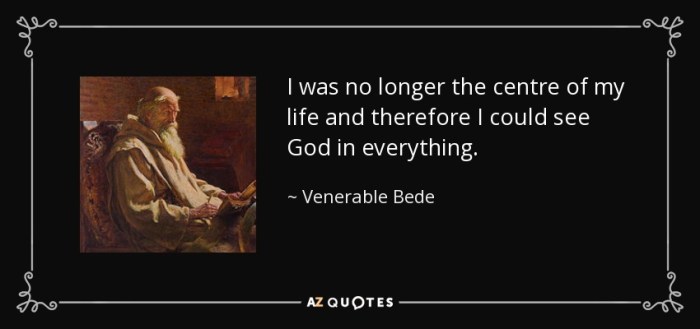St bede the venerable quotes – Delve into the profound world of St Bede the Venerable’s quotes, where history, faith, and philosophy intertwine to offer timeless insights. From his humble beginnings as a monk to his profound influence on Western culture, Bede’s words continue to resonate with profound relevance.
Throughout his life, Bede dedicated himself to scholarship and the pursuit of knowledge, leaving behind a legacy of writings that have shaped our understanding of Christianity and the world we inhabit. His quotes offer a glimpse into his brilliant mind, revealing his deep understanding of human nature, the power of faith, and the importance of seeking wisdom.
Historical Significance: St Bede The Venerable Quotes

St. Bede the Venerable, also known as the “Father of English History,” was a Benedictine monk who lived in the 8th century. He was born in 673 AD in Jarrow, Northumbria, England. Bede’s contributions to scholarship and Christianity were immense, and he played a significant role in the development of Western culture.
Contributions to Scholarship
Bede was a prolific writer and scholar. He wrote over 40 books on a wide range of topics, including history, theology, science, and literature. His most famous work is the Ecclesiastical History of the English People, which is considered to be the first history of England.
Bede’s writings were widely read and influential in the Middle Ages, and they continue to be studied by scholars today.
Contributions to Christianity
Bede was also a devout Christian. He was ordained a priest in 702 AD, and he spent his life teaching and preaching the gospel. Bede was a strong advocate for the Benedictine Rule, and he helped to establish Benedictine monasteries throughout England.
Bede’s writings on theology and spirituality were highly influential in the development of Christianity in England.
Role in the Development of Western Culture
Bede’s contributions to scholarship and Christianity had a profound impact on the development of Western culture. His writings helped to shape the way that people in the Middle Ages thought about history, religion, and science. Bede’s work also helped to spread Christianity throughout England, and it played a role in the development of Western civilization.
Major Themes in Quotes

St. Bede the Venerable’s quotes encompass a range of theological, philosophical, and historical themes. These themes provide insights into his worldview and the challenges he faced during his time.
One of the central themes in Bede’s quotes is the importance of faith and spirituality. He believed that faith was essential for salvation and that it should be expressed through good works and devotion. Bede also emphasized the importance of studying the Bible and the writings of the Church Fathers, as he believed that these works provided guidance and inspiration for living a Christian life.
The Power of Education
Bede was a strong advocate for education, believing that it was essential for both the individual and society as a whole. He established schools and libraries, and his writings on history, science, and theology were widely read and influential throughout Europe.
Bede believed that education could help people to understand the world around them and to live more fulfilling lives.
The Importance of History
Bede was also a renowned historian, and his work, the Ecclesiastical History of the English People, is considered one of the most important historical works of the Middle Ages. Bede believed that history was important for understanding the present and for learning from the mistakes of the past.
He also believed that history could provide inspiration and guidance for future generations.
Examples and Analysis

St. Bede the Venerable’s quotes offer a wealth of insights into his beliefs and teachings. They are characterized by their clarity, conciseness, and profound spiritual wisdom.
Language, Imagery, and Symbolism
Bede’s language is simple and direct, yet it is also rich in imagery and symbolism. He frequently uses metaphors and similes to illustrate his points and make them more accessible to his audience. For example, in his Ecclesiastical History of the English People, he compares the Church to a ship sailing through the stormy seas of life.
Key Beliefs and Teachings
Bede’s quotes reflect his key beliefs and teachings, including the importance of humility, the power of prayer, and the value of education. He believed that true humility is not about self-deprecation, but rather about recognizing one’s own limitations and dependence on God.
He also emphasized the importance of prayer, both as a way of communicating with God and as a means of spiritual growth.
Examples
“The true measure of a man is not how much he knows, but how much he loves.”
This quote reflects Bede’s belief that love is the most important virtue. He believed that love is the foundation of all good relationships and that it is the only thing that can truly unite people.
“Prayer is the key to heaven, and the gate of paradise.”
This quote reflects Bede’s belief in the power of prayer. He believed that prayer is a way of communicating with God and that it can help us to overcome our difficulties and achieve our goals.
“Education is the best gift that we can give to our children.”
This quote reflects Bede’s belief in the value of education. He believed that education is essential for both personal and social development. He also believed that education should be accessible to all, regardless of their social status or background.
Influence on Literature and Thought

St. Bede the Venerable’s profound insights and prolific writings have had an enduring impact on subsequent generations, shaping literature, philosophy, and religious thought.
His historical accounts, particularly his Ecclesiastical History of the English People, served as a foundational text for medieval historiography, providing invaluable insights into the development of Christianity in England and beyond.
Literature
Bede’s influence on literature is evident in the works of later medieval writers, such as Geoffrey of Monmouth and William of Malmesbury, who drew inspiration from his historical narratives and incorporated them into their own literary creations.
Philosophy
Bede’s writings on theology and philosophy laid the groundwork for the development of scholasticism, a prominent philosophical movement in the Middle Ages. His emphasis on reason and logic influenced thinkers like Anselm of Canterbury and Thomas Aquinas.
St. Bede the Venerable’s wise words continue to inspire, reminding us of the importance of knowledge and faith. To delve deeper into these teachings, why not try the free abo practice test 2022 ? This valuable resource offers insights into St.
Bede’s philosophy, helping us better understand his profound impact on Christian thought and practice.
Religious Thought, St bede the venerable quotes
Bede’s theological writings, particularly his commentaries on the Bible, had a profound impact on religious thought. His insights into Scripture and the lives of the saints shaped the devotional practices and beliefs of countless individuals throughout the centuries.
Contemporary Resonance
St. Bede the Venerable’s ideas continue to resonate in contemporary society, inspiring scholars, theologians, and individuals alike. His emphasis on the importance of education, the pursuit of knowledge, and the power of faith remains relevant in today’s world.
Application to Modern Life

St. Bede the Venerable’s quotes remain highly relevant in modern life, offering guidance and inspiration in the face of contemporary challenges. His insights into the nature of history, the importance of education, and the pursuit of knowledge are particularly applicable to the present day.
His teachings encourage us to approach life with a sense of purpose and a commitment to intellectual growth. They remind us of the importance of seeking knowledge, not only for personal enrichment but also for the benefit of society as a whole.
Contemporary Issues and Challenges
| St. Bede’s Teachings | Contemporary Issues and Challenges |
|---|---|
| “The greatest glory of a Christian is to live without sin.” | Ethical challenges in modern society, such as corruption, dishonesty, and moral decay. |
| “He who loves not books has never tasted true enjoyment.” | Declining literacy rates and the need to promote a culture of reading and intellectual inquiry. |
| “The more you learn, the more you understand that you know nothing.” | The importance of lifelong learning and humility in the face of the vastness of knowledge. |
| “History is the witness of the times, the light of truth, the life of memory, the teacher of life, and the messenger of antiquity.” | The role of history in shaping our understanding of the present and the need for historical literacy. |
Question & Answer Hub
Who was St Bede the Venerable?
St Bede was an English monk, historian, and theologian who lived in the 8th century. He is known for his extensive writings on history, science, and religion, including his famous work “The Ecclesiastical History of the English People.”
What are the major themes in St Bede the Venerable’s quotes?
St Bede’s quotes often focus on themes such as the importance of faith, the pursuit of knowledge, and the power of love. He believed that true happiness comes from living a life in accordance with God’s will and that education is essential for personal growth and spiritual development.
How have St Bede the Venerable’s quotes influenced literature and thought?
St Bede’s quotes have had a profound influence on literature and thought throughout history. His writings have been cited by countless authors and scholars, and his ideas have shaped the development of Western culture. His emphasis on the importance of history and education has inspired generations of students and scholars.
